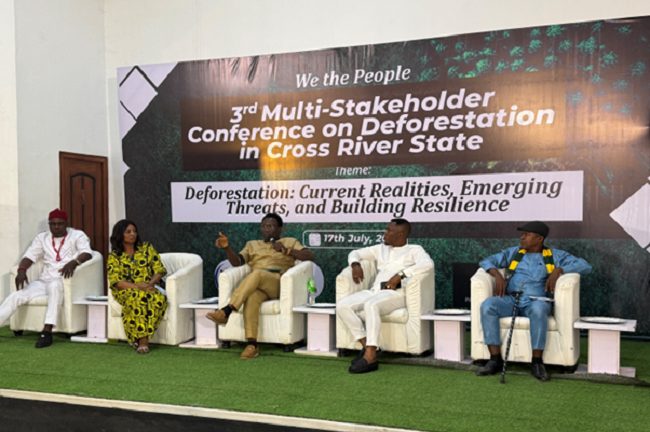Concerned with the escalating threat of deforestation in Cross River State, We the People, a non-governmental organisation (NGO), and partners held the 3rd edition of the annual Multi-Stakeholder Conference on Deforestation on July 17, 2025, in Calabar, the state capital, assembling stakeholders including community leaders, conservationists, public officials, legal practitioners, the academia, and the media.
Among others, the meeting aimed to emphasise the growing threat of deforestation in Cross River State, examine the shortcomings and challenges associated with government responses, explore policy options for ending forest loss in the state, highlight strategies for protecting wildlife, learn from and empower communities to protect the forests, and design strategies for long term multi-stakeholder cooperation on forest protection.

The conference, which had over 130 participants, featured an opening presentation highlighting the scale of the deforestation problem by We the People’s Executive Director, Ken Henshaw, a keynote presentation by Dr. Nnimmo Bassey, inputs by Dr. Odigha Odigha, Dr. Martins Egot, and the Conservator of Parks, among others.
Deliberation at the conference centred around building global partnership to end deforestation, legislative opportunities for improving forest management, community strategies and opportunities for protecting forests and preserving wildlife, as well as the emerging dynamics of solid mining and deforestation in Cross River State.
The conference observed that, in 2008, the Cross River State Government instituted a ban on all forest activities, specifically targeting loggers which it considered the key drivers of deforestation at the time. For the government, this action was necessitated by the need to protect the most critical asset of Cross River state which is its vast forests and the wildlife it shelters. Despite the ban, reputable studies indicate that by 2014 1,070Km2 of forest had been lost.
While data for deforestation between 2014 and 2023 are scarcely available, all evidence indicates an alarming rise in forest loss within the period. In 2023, the government came to terms with the futility of the forest ban and the United Nations supported Reducing Emissions from Deforestation and Forest Degradation (REDD+) that inspired it and immediately lifted the ban.
The conference further observed that despite the new forest management strategy by the current administration in the state, deforestation continues at an alarming rate, and the classification of Cross River State as the location of West Africa’s largest forests is no longer factual.
The conferences also observed that logging activities have assumed more sinister and troubling proportions in the state. The illicit trade in timber has expanded to include foreign interests as well as international dimensions. Exotic species of wood are illegally extracted from the forests and exported overseas. While the forests undergo systematic dissipation, communities who traditionally own these forests and have protected it for generations are not only losing their livelihoods, but also their heritage.
The conference made the observation that mining for solid mineral in reserved parts of the forests in Cross River State was an emergent factor in deforestation, as well as a major cause of insecurity and social disruptions.
After extensive deliberations, the conference noted the following;
- That deforestation has reached alarming proportions in Cross River State, across the National Park, State Forest Reserves and Community Forests.
- That currently, deforestation is being driven by an array of factors including foreigners who work with local collaborators to facilitate illegal logging, rogue law enforcement officials who circumvent the rules, and some compromised communities who provide access to loggers.
- That the spread of plantations including cocoa plantations and oil palm plantations have emerged as a key driver of deforestation, noting that these plants do not play the same role as natural forests.
- That the agencies of government saddled with the responsibility of preserving the forests were ill funded, ill staffed and ill equipped to sufficiently play their roles.
- That in crafting strategies for ending deforestation, communities have often been ignored, and this has led to a weakening of collaboration.
- That the Cross River State Forestry Law 2007 is currently outdated and insufficient to address the myriad challenges facing the state’s forests.
Based on the above, the conference resolved and made the following recommendations;
- The government of Cross River State must initiate plans to review the state Forestry law towards making it more effective for protecting the forests, and bringing it into sync with other national laws and international frameworks on climate change and energy transition.
- As a matter of priority, the state government should strengthen the agencies of state responsible for forest management including the Cross River State Forestry Commission. This effort will provide the expertise and facilities necessary to protect the forests and its wildlife.
- The government should actively create synergy with indigenous communities located around forested areas. This will create the incentives, partnership and indigenous know-how required to effectively manage and protect the forest.
- The government of Cross River State should cease engaging the state’s forest as a source of revenue through timber sales or concessions. It should rather leverage on the ecotourism and climate change mitigations potentials of the forests to generate critical partnerships and financial support.
- The state government should end the practice of giving concessions for plantation development in forested areas. In line with this, the government should reassess concessions already given to ensure that those concessions have not gone beyond their original allocations.
- The state government must immediately arrest the escalating threat of mining in reserved forest areas. It is recommended that the state government works with security operatives and the Federal Ministry of Mines to address this threat.
